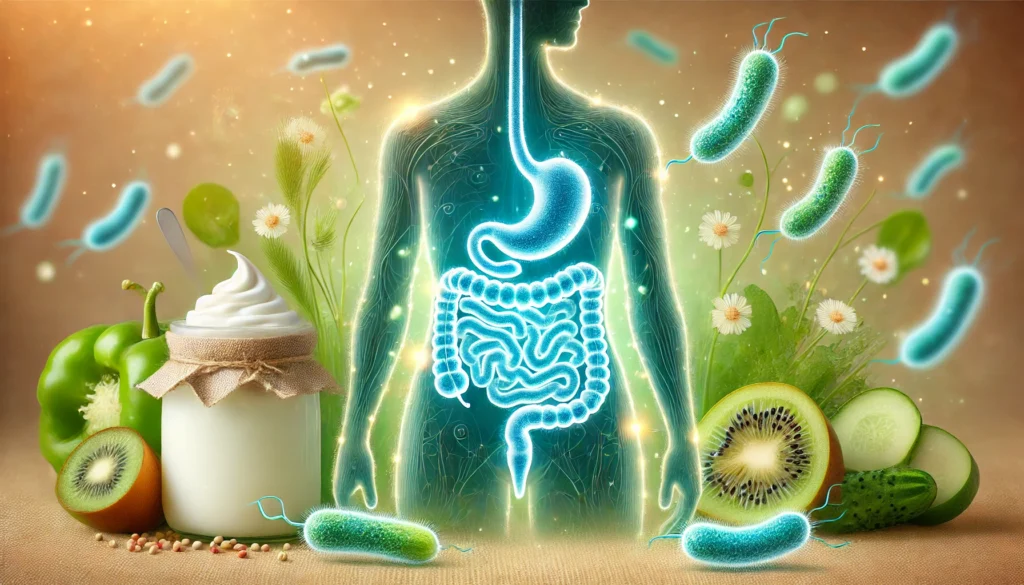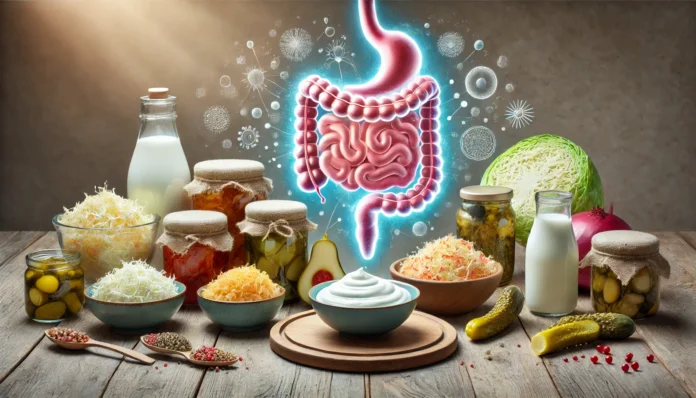Understanding the Gut Microbiome and Its Role in Digestion
The human gut is home to a complex ecosystem of microorganisms known as the gut microbiome. This intricate system consists of trillions of bacteria, fungi, and other microbes that play a crucial role in digestion, immune function, and overall health. The balance of these microorganisms is essential for maintaining gut health and ensuring regular bowel movements. When the gut microbiome is imbalanced, digestive discomfort such as constipation and bloating can occur. Research has shown that probiotics—beneficial live bacteria—can help restore this balance and support healthy digestion.
You may also like: How to Improve Gut Health Naturally: Science-Backed Tips for a Stronger Microbiome
Probiotics contribute to gut health by enhancing the breakdown of food, aiding in nutrient absorption, and promoting bowel regularity. These beneficial bacteria produce short-chain fatty acids, which help maintain the integrity of the intestinal lining and support smooth digestion. Additionally, probiotics play a role in regulating the production of gases in the gut, which can reduce bloating and discomfort. Understanding the relationship between probiotics and the digestive system is key to selecting the best probiotic strains for constipation and bloating.
Common Causes of Constipation and Bloating
Constipation and bloating can arise from a variety of factors, including diet, lifestyle, and underlying medical conditions. One of the most common causes is inadequate fiber intake, which affects stool consistency and slows intestinal motility. A lack of sufficient hydration can also contribute to constipation by making stools harder and more difficult to pass. Additionally, a sedentary lifestyle may reduce gut motility, leading to prolonged transit time of food through the digestive tract.
Bloating, on the other hand, often results from excess gas production in the gut. This can be caused by consuming gas-producing foods such as beans, cruciferous vegetables, and carbonated drinks. Food intolerances, such as lactose or gluten intolerance, may also lead to bloating and discomfort. Furthermore, an imbalance in gut bacteria—often referred to as dysbiosis—can disrupt the normal fermentation process in the intestines, leading to excessive gas accumulation and bloating. Addressing these underlying causes through dietary modifications and probiotic supplementation can help restore gut balance and alleviate digestive discomfort.
How Probiotics Support Digestive Health
Probiotics exert their beneficial effects on digestion through several mechanisms. One of their primary roles is to increase the population of beneficial bacteria while suppressing the growth of harmful pathogens. By doing so, probiotics create a more favorable environment for digestion and nutrient absorption. Certain probiotic strains also produce enzymes that aid in the breakdown of complex carbohydrates, reducing the likelihood of undigested food fermenting in the intestines and causing gas buildup.
Another important function of probiotics is their ability to enhance intestinal motility. Slow-moving bowels can lead to constipation, but probiotics help regulate peristalsis—the rhythmic contractions of the intestines—ensuring smoother passage of stool. Additionally, probiotics strengthen the gut barrier, preventing harmful substances from entering the bloodstream and contributing to inflammation. These combined effects make probiotics an effective tool for addressing constipation and bloating.

Selecting the Best Probiotics for Constipation and Bloating
Not all probiotics are equally effective in alleviating digestive issues. Different probiotic strains have distinct benefits, and selecting the right strains is essential for achieving optimal results. The best probiotics for constipation and bloating include strains that enhance gut motility, support fermentation balance, and reduce gas production.
Lactobacillus acidophilus is one of the most well-researched probiotic strains known for its ability to support digestive health. It helps maintain a balanced gut microbiome by inhibiting harmful bacteria and promoting the growth of beneficial microbes. Studies suggest that Lactobacillus acidophilus can help alleviate constipation by stimulating bowel movements and reducing bloating.
Bifidobacterium lactis is another powerful probiotic strain that has been shown to improve stool consistency and frequency. This strain works by breaking down fiber and producing short-chain fatty acids that enhance gut motility. It is particularly beneficial for individuals with chronic constipation or irregular bowel movements.
Saccharomyces boulardii, a beneficial yeast probiotic, has been studied for its role in reducing bloating and regulating bowel function. Unlike bacterial probiotics, Saccharomyces boulardii survives stomach acid more effectively and colonizes the intestines, promoting a healthier digestive environment. It is often used to manage diarrhea and constipation associated with gut imbalances.
Lactobacillus rhamnosus is known for its ability to support gut barrier function and reduce inflammation. This strain has been linked to improvements in digestive comfort, including reductions in bloating and gas production. It also plays a role in supporting a healthy immune response within the gut.
Bifidobacterium breve is particularly effective in reducing bloating and gas accumulation. This strain helps ferment dietary fiber efficiently, preventing excessive gas formation. Additionally, it supports overall gut health by modulating the immune system and maintaining microbial balance.
Incorporating Probiotics into Your Daily Routine
To experience the benefits of probiotics for constipation and bloating, it is essential to incorporate them consistently into your daily routine. Probiotics are available in various forms, including capsules, powders, and fermented foods such as yogurt, kefir, and kimchi. Choosing a high-quality probiotic supplement with clinically studied strains can enhance gut health more effectively.
When introducing probiotics, it is important to start with a lower dose and gradually increase it to allow the gut to adjust. Some individuals may experience mild bloating or gas initially as the gut microbiome adapts. Staying hydrated and consuming a fiber-rich diet can further support probiotic efficacy. Additionally, combining probiotic supplementation with prebiotics—non-digestible fibers that nourish beneficial bacteria—can enhance their survival and colonization in the gut.

Frequently Asked Questions (FAQ) on the Best Probiotics for Constipation and Bloating
1. How do probiotics specifically help with constipation?
Probiotics aid constipation by restoring balance in the gut microbiome, which plays a key role in digestion and stool formation. They enhance peristalsis, the wave-like movements of the intestines, helping to move stool more efficiently through the digestive tract. Some probiotic strains also increase water content in the stool, making it easier to pass and reducing discomfort associated with hard stools. Additionally, probiotics produce short-chain fatty acids that nourish intestinal cells and improve overall gut motility. Consistent use of the best probiotics for constipation and bloating can result in more regular bowel movements over time.
2. Can probiotics reduce bloating immediately, or do they take time to work?
The effects of probiotics on bloating depend on the individual and the severity of gut imbalance. While some people experience relief within a few days, others may need several weeks to notice significant improvements. Probiotics work by gradually adjusting the gut microbiota, reducing gas-producing bacteria while promoting beneficial strains. During the initial phase, some individuals may temporarily experience more bloating as the gut adjusts. Long-term use of the best probiotic for regularity ensures sustained digestive health benefits and minimized bloating episodes.
3. Are certain probiotic strains more effective for constipation relief than others?
Yes, specific probiotic strains are more beneficial for constipation relief due to their unique functions in the gut. Bifidobacterium lactis has been shown to improve stool consistency and frequency, while Lactobacillus acidophilus enhances gut motility. Bifidobacterium breve helps regulate digestion by breaking down dietary fiber efficiently, reducing bloating and discomfort. Saccharomyces boulardii, a yeast-based probiotic, supports the overall gut environment and prevents harmful bacteria from proliferating. Selecting a probiotic supplement containing a combination of these strains can offer optimal results for constipation and bloating relief.
4. Can probiotics replace laxatives for constipation management?
While probiotics can promote long-term gut health and regularity, they do not provide the immediate relief that laxatives do. Unlike laxatives, which stimulate bowel movements forcefully, probiotics support natural digestion by improving gut microbiome balance. Over time, taking the best probiotics for constipation and bloating can help reduce reliance on laxatives by promoting consistent, healthy bowel movements. However, individuals with severe or chronic constipation may need to combine probiotics with other dietary and lifestyle adjustments for best results. Consulting a healthcare provider can help determine the best approach based on individual needs.
5. Should probiotics be taken with food or on an empty stomach for maximum effectiveness?
The effectiveness of probiotics can vary depending on when they are taken. Some strains survive stomach acid better when consumed with food, as meals help buffer the acidity of the stomach. Fat-containing foods, in particular, may enhance the survival of probiotic bacteria as they pass into the intestines. However, certain formulations, such as enteric-coated probiotics, are designed to withstand stomach acid and can be taken on an empty stomach. To maximize the benefits of the best probiotic for regularity, it is essential to follow the manufacturer’s instructions and maintain consistency in supplementation.
6. Do prebiotics enhance the effectiveness of probiotics?
Yes, prebiotics serve as fuel for probiotics, helping beneficial bacteria flourish in the gut. Prebiotics are non-digestible fibers found in foods like bananas, onions, garlic, and whole grains. When consumed alongside probiotics, they create a synergistic effect, improving gut colonization and efficacy. This combination, known as synbiotics, enhances digestive health and can further improve stool regularity and reduce bloating. Individuals seeking the best probiotics for constipation and bloating should consider incorporating prebiotic-rich foods or supplements into their diet for added benefits.
7. Can taking probiotics cause bloating or other digestive discomforts initially?
Some individuals may experience temporary bloating, gas, or mild digestive discomfort when starting probiotics. This is usually a sign that the gut microbiome is adjusting to the introduction of beneficial bacteria. As probiotics begin crowding out harmful microbes and modifying gut fermentation patterns, gas production may initially increase. However, these effects typically subside within a few days to weeks. Gradually increasing the dosage of the best probiotic for regularity and drinking plenty of water can help ease the adjustment period and minimize discomfort.
8. Are there any lifestyle changes that can enhance the effectiveness of probiotics for constipation and bloating?
Yes, incorporating certain lifestyle habits can significantly enhance probiotic effectiveness. Staying hydrated ensures softer stools, making bowel movements easier. Regular physical activity stimulates intestinal motility, reducing constipation risk. A diet rich in fiber from vegetables, fruits, and whole grains helps probiotics function optimally by providing necessary nutrients for gut bacteria. Managing stress through meditation, yoga, or other relaxation techniques can also improve gut health, as stress negatively impacts digestion. Combining these lifestyle changes with the best probiotics for constipation and bloating maximizes digestive benefits.
9. How do probiotic supplements compare to probiotic-rich foods for relieving constipation and bloating?
Both probiotic supplements and probiotic-rich foods offer digestive benefits, but they differ in concentration and consistency. Supplements provide standardized, high-dose probiotic strains, making them ideal for targeted digestive health improvements. Fermented foods like yogurt, kefir, kimchi, and sauerkraut contain natural probiotics along with additional nutrients beneficial for gut health. However, the bacterial content in foods can vary depending on fermentation methods and storage conditions. Individuals seeking reliable relief may benefit from supplementing with the best probiotic for regularity while incorporating probiotic foods into their diet for overall gut support.
10. Can children and older adults safely take probiotics for digestive issues?
Probiotics are generally safe for both children and older adults, but the appropriate strains and dosages should be considered. For children, probiotics can help regulate digestion, reduce colic, and improve immune function. Older adults, who may experience age-related changes in gut microbiota, can benefit from probiotics to enhance digestion and prevent constipation. However, individuals with compromised immune systems or chronic health conditions should consult a healthcare professional before taking probiotics. Selecting age-appropriate formulations of the best probiotics for constipation and bloating ensures safe and effective use for all age groups.

Conclusion: Restoring Gut Balance with the Right Probiotics
Optimizing gut health is crucial for maintaining regular digestion and reducing discomfort caused by constipation and bloating. The best probiotics for constipation and bloating work by improving gut motility, enhancing microbial balance, and reducing gas production. Strains such as Lactobacillus acidophilus, Bifidobacterium lactis, Saccharomyces boulardii, Lactobacillus rhamnosus, and Bifidobacterium breve offer targeted benefits for digestive health.
Incorporating probiotics into a daily regimen through supplements or fermented foods can support long-term gut balance. Along with dietary and lifestyle modifications, probiotics provide a natural and effective approach to achieving regularity and overall digestive wellness. By selecting high-quality probiotic strains and maintaining consistency in use, individuals can experience significant improvements in gut health and overall well-being.
gut health supplements, digestive enzymes for bloating, natural remedies for constipation, probiotics for digestive wellness, intestinal health support, best gut-friendly foods, microbiome balance, healthy digestion tips, fermented foods for gut health, improving bowel movements, digestive system support, probiotics for gas relief, stomach bloating solutions, best supplements for digestion, gut microbiota restoration, natural gut healing, prebiotics and probiotics synergy, constipation relief methods, optimal digestive function, holistic digestive health
Further Reading:
Efficacy of Probiotic Compounds in Relieving Constipation and Their Colonization in Gut Microbiota
Systematic review: probiotics in the management of lower gastrointestinal symptoms
Probiotics for constipation: Do they help?
Disclaimer
The information contained in this article is provided for general informational purposes only and is not intended to serve as medical, legal, or professional advice. While Health11News strives to present accurate, up-to-date, and reliable content, no warranty or guarantee, expressed or implied, is made regarding the completeness, accuracy, or adequacy of the information provided. Readers are strongly advised to seek the guidance of a qualified healthcare provider or other relevant professionals before acting on any information contained in this article. Health11News, its authors, editors, and contributors expressly disclaim any liability for any damages, losses, or consequences arising directly or indirectly from the use, interpretation, or reliance on any information presented herein. The views and opinions expressed in this article are those of the author(s) and do not necessarily reflect the official policies or positions of Health11News.


